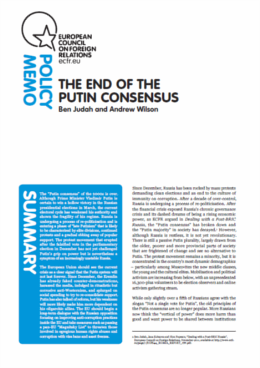The end of the Putin consensus
Putin’s return: why Europe should prepare for a weaker Putin
Putin’s return: why Europe should prepare for a weaker Putin
On Sunday 4th March Russians will chose their next president. Although Vladimir Putin is certain to win, it will be a hollow victory and his next presidency will be weaker than before. After the ‘phantom presidency’ of Dmitry Medvedev, Vladimir Putin will find himself president of a changed Russia. Central authority is weaker, the economy is faltering and the restless middle classes are confident enough to protest against the government.
'The end of the Putin consensus' by Ben Judah and Andrew Wilson argues that:
-
The financial crisis has exposed Russia’s chronic governance crisis and dashed its dreams of being a true rising economic power. Russia suffered the G20’s deepest recession in 2009. See ECFR’s report ‘Dealing with a post-BRIC Russia’.
-
Recent protests show that Russia is restless but not yet revolutionary. The protest movement is a minority, but is drawn from Russia’s most dynamic demographic groups – the Moscow based, the middle class, the young and the cultural elite.
-
Electoral fraud is often unsophisticated and discrepancies are easy to expose thanks to the booming blogosphere. For instance exit polls in Moscow gave United Russia 32% of the vote in recent parliamentary elections, but the final count gave it 46.5%.
- Despite his promises of reform, Putin will be more dependent on oligarch allies and prone to economic populism.
With a re-elected President Putin under increasing pressure at home the European Union should expect Russia to be more withdrawn and less co-operative in foreign policy, in areas from the Middle East to frozen conflicts. Moscow’s obstructive Syria policy has been presented domestically as ‘standing up to the West’.
The authors argue the EU should:
-
Loudly defend human rights, but refrain from loud support for the opposition movement (unlike some Americans who have embraced it), to avoid charges of the protesters being Western stooges.
-
Pass a pan-European ‘Magnitsky List’ – a blacklist that imposes visa bans and asset freezes on those connected to the death of the lawyer Sergei Magnitsky. This would indicate the EU’s red lines on egregious human rights violations.
- Launch a new anti-corruption dialogue with Russia that includes opposition leaders and government officials. The Russian elite currently uses the EU as a safe haven for its money, and the opposition is calling for the EU to change laws to make it harder for dirty money to find a safe berth in Europe.
Click here to listen to a podcast interview with co-author Ben Judah
The European Council on Foreign Relations does not take collective positions. ECFR publications only represent the views of their individual authors.



